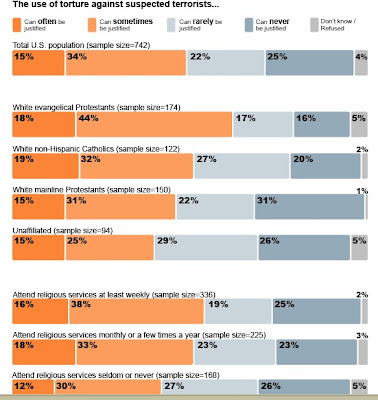In contrast to the many voices fearfully justifying their support, or rare acceptance, of torture... you know..."for the good of the many," I can think of three reasons why torture should NEVER be justified :
Number ONE) It doesn't work! There are numerous studies and reports that show this to be true:
One of the main arguments given for using torture is that it is a means to a truth and that torturing a person outweighs the hundreds of lives that could be saved. But, this argument is ill-founded. Even the CIA's own Human Resource Exploitation Manual of 1983 clearly notes that use of force only induces the victim to say what he thinks the torturer wants to hear...
"the only thing that torture guarantees is pain, it never guarantees the truth".
-Torture Care
"...there is irrefutable evidence from the civilian criminal justice system that techniques less coercive than torture have produced verifiably false confessions in a surprising number of cases... -SPSSI
Number TWO) It damages, beyond repair, the tortured! I have personally witnessed the broken life of one tortured by her own father. Some of you know who I am speaking of, please don't mention names in this public place. I spoke often with the little girls, trapped, forever young, inside the adult body, along with the other fragments of the amazingly intelligent creative person she was not allowed to become. No amount of medical or psychological treatment can completely overcome the scars left by the one who should have loved and protected her.
Perhaps you think it's different when we are discussing adults, enemy combatants, "bad guys." I disagree! NO human (or animal, even) should ever be subjected to torture. It's even worse when you realize that we had/have teenagers held as enemy combatants at Guantanamo, and then take into consideration that many of those we brought there were random strangers people turned in for the cash reward we offered. How many innocent civilians did we "interrogate?" How many people has our country permanently scarred?
"The objective of torture is to try and destroy somebody physically, psychologically and spiritually," says Alex Sklan, MF Clinical Director. "The sensation of pain after the torture has happened is a reminder of what caused the pain in the first place. I've heard clients who were subjected to very sophisticated methods of torture where they were made to squat for hours, which damaged their backs. They were told 'you'll remember this for the rest of your life'. It's part of the destruction process; 'you won't be able to function because you'll always remember this pain'."
It can take years to combat the effects of torture that may have involved repeated rape, whipping, beatings, starvation, prolonged isolation, suspension with hooks, being cut with broken glass and being forced to listen as others are executed. The methods vary in sophistication and cruelty. Sklan refers to the need for survivors to transcend torture, a process that can take years and will never be fully complete because the reminders will always seep back in; even when the physical scars have grown less distinct, the psychological scars will always be indelible. -Torture Care
Number THREE) It damages, in ways unknown, the torturers! How can we justify creating monsters, forming calloused minds, that are capable of stripping a human being of its dignity, it's sense of security, its humanity. What consequences are there when this person steps out of the concealed secret rooms and joins society as a father, mother, husband, wife, son, daughter, friend, leader, neighbor...
The effects of torture are never confined to the interrogation room. The cruelty extends far beyond the moment and there are well-documented instances where knowing the suspects to be innocent, the torturers have remained unrepentant.
A
study from 2004 found that 1 in 8 soldiers returning from the war in Iraq suffered from Post Traumatic Stress Syndrome. Have any studies been done on the psychological well being of the interrogators themselves? I don't know, and am out of time to research any more. If you know of a study please share it with me!
Ultimately, I believe that the negative consequences of torture far outweigh any perceived benefit. I think we, as a society, have been filled with fear, and when afraid, we are able to justify the unthinkable because we have been led to believe that it will make us safer. I believe we have been lied to! I believe the acceptance of torture itself is much, much more dangerous than what it is supposed to keep protect us from.
The acceptance and use of torture and other forms of cruel, inhumane, or degrading treatment in military or law enforcement situations has far-reaching implications for society. Impunity for perpetrators of torture (whether offered directly as a result of legal action or indirectly through neglect or incompetence) has been examined for ways in which it can affect the survivor, the perpetrator, and the community, including through an erosion of moral codes; an implied acceptance of violent behavior in the community; feelings of fear; helplessness and insecurity in society; and “social alienation” manifested by feelings of failure and skepticism, frustration, and addictive and violent behavior. -SPSSI
Well, I am out of time today. The words of Matthew 10:26 found in one of my
other posts on torture, encourages me again:
"So do not be afraid of them. There is nothing concealed that will not be disclosed, or hidden that will not be made known. "



